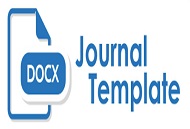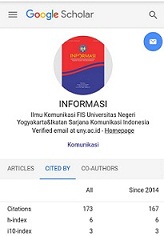Directorate General of Taxes working from home: A phenomenology of Singkawang Tax Office employees during Covid-19 pandemic
DOI:
https://doi.org/10.21831/informasi.v51i1.34255Keywords:
work from home, phenomenology, home-based employees, covid-19 pandemic, remote workingAbstract
Working from home (WFH) is a new thing for Directorate General of Taxes (DGT) which has the most extensive office distribution among vertical agencies of Indonesian government, surely has its own challenges in implementing WFH during Covid-19 pandemic. Such as the Singkawang Tax Office which has 86% non-homebase employees that appear to have different meaning about WFH which can affect their public service. This phenomenology study wants to examine the meaning of WFH based on the experience of DGT non- homebase employees along with their various conditions and backgrounds. Six employees were deeply interviewed by purposive sampling technique. The research findings showed that WFH was defined as new step in carrying out the government bureaucracy and public service. The different meanings of WFH were not only influenced by the location of office but also by the differences of cultural background, age, educational background, and position; that affected their performance in carrying out government bureaucracy and undergoing tasks related to public service. The reward and punishment rules for employees discipline during WFH was defined as organization's response to maintain all organization performances. These findings raise implications for public service organizations running WFH during covid-19.
References
Altman, J. (2020). Performance Management for Remote Workers. https://lattice.com/library/performance-management-for-remote-workers
Arnfalk, P., Pilerot, U., Schillander, P., & Grí¶nvall, P. (2016). Green IT in practice: Virtual meetings in Swedish public agencies. Journal of Cleaner Production, 123, 101–112. https://doi.org/10.1016/j.jclepro.2015.08.063
BenetytÄ—;, D., & JatuliaviÄienÄ—, G. (2013). Building and Sustaining Trust in Virtual Teams within Organizational Context. Region Formation & Development Studies, 2(10), 18–31.
Borowski, E., Chen, Y., & Mahmassani, H. (2020). Social media effects on sustainable mobility opinion diffusion: Model framework and implications for behavior change. Travel Behaviour and Society, 19(December 2019), 170–183. https://doi.org/10.1016/j.tbs.2020.01.003
Cambridge Dictionary. (n.d.). Meaning of remote working in English. Retrieved June 22, 2020, from https://dictionary.cambridge.org/dictionary/english/remote-working
Casaló, L. V., Flavián, C., & Ibáñez-Sánchez, S. (2018). Influencers on Instagram: Antecedents and consequences of opinion leadership. Journal of Business Research, July. https://doi.org/10.1016/j.jbusres.2018.07.005
Chaterine, R. N. (2020). Kemenkes: Corona Bencana Nasional, Bukan Darurat Nasional. https://news.detik.com/berita/d-4939175/kemenkes-corona-bencana-nasional-bukan-darurat-nasional
CNN Indonesia. (2020). Jokowi Imbau Masyarakat Bekerja dan Beribadah di Rumah. https://www.cnnindonesia.com/nasional/20200315141316-32-483586/jokowi-imbau-masyarakat-bekerja-dan-beribadah-di-rumah
Daim, T. U., Ha, A., Reutiman, S., Hughes, B., Pathak, U., Bynum, W., & Bhatla, A. (2012). Exploring the communication breakdown in global virtual teams. International Journal of Project Management, 30(2), 199–212. https://doi.org/10.1016/j.ijproman.2011.06.004
DGT. (2018). 1 Oktober 2018, Ditjen Pajak Resmikan 23 Kantor Baru. https://www.pajak.go.id/1-oktober-2018-ditjen-pajak-resmikan-23-kantor-baru
G. Malakyan, P. (2020). Digital Leader-Followership for the Digital Age: A North American Perspective. Digital Leadership - A New Leadership Style for the 21st Century, 1–24. https://doi.org/10.5772/intechopen.89820
Ghina, S. (2020). Flexible Working Space, Pola Kerja Baru Kementerian Keuangan RI. https://www.suara.com/yoursay/2020/06/13/132755/flexible-working-space-pola-kerja-baru-kementerian-keuangan-ri?page=all
Ghura, R. (2020). Remote Work Before and During COVID-19. https://www.hcltech.com/blogs/remote-work-and-during-covid-19
Hadi, A. G., Kadhom, M., Hairunisa, N., Yousif, E., & Mohammed, S. A. (2020). A review on COVID-19: Origin, spread, symptoms, treatment, and prevention. Biointerface Research in Applied Chemistry, 10(6), 7234–7242. https://doi.org/10.33263/BRIAC106.72347242
Humas MenpanRB. (2020). "Work From Home" ASN Diperpanjang Hingga 13 Mei 2020. https://www.menpan.go.id/site/berita-terkini/work-from-home-asn-diperpanjang-hingga-13-mei-2020
Kramer, A., & Kramer, K. Z. (2020). The potential impact of the Covid-19 pandemic on occupational status, work from home, and occupational mobility. Journal of Vocational Behavior, 119, 103442. https://doi.org/10.1016/j.jvb.2020.103442
Kuscu, M., & Arslan, H. (2016). Virtual Leadership at Distance Education Teams. Turkish Online Journal of Distance Education, 17(3), 136–156. https://doi.org/10.17718/tojde.79230
Lavelle, J. (2020). Gartner CFO Survey Reveals 74% Intend to Shift Some Employees to Remote Work Permanently. https://www.gartner.com/en/newsroom/press-releases/2020-04-03-gartner-cfo-surey-reveals-74-percent-of-organizations-to-shift-some-employees-to-remote-work-permanently2
MacHe, S., Servaty, R., & Harth, V. (2020). Flexible work arrangements in open workspaces and relations to occupational stress, need for recovery and psychological detachment from work. Journal of Occupational Medicine and Toxicology, 15(1), 1–11. https://doi.org/10.1186/s12995-020-00258-z
Ministry of Finance. (n.d.). Sebaran Pegawai Kementerian Keuangan. Retrieved June 24, 2020, from https://www.sdm.kemenkeu.go.id/
Ministry of Finance. (2020). Flexible Working Space, Budaya Kerja Baru kemenkeu untuk Tingkatkan Produktivitas dan Kinerja Organisasi. https://www.djkn.kemenkeu.go.id/berita/baca/20571/Flexible-Working-Space-Budaya-Kerja-Baru-kemenkeu-untuk-Tingkatkan-Produktivitas-dan-Kinerja-Organisasi.html
RaiÅ¡ienÄ—, A. G., & JonuÅ¡auskas, S. (2013). Silent issues of ICT era: impact of techno-stress to the work and life balance of employees. Entrepreneurship and Sustainability Issues, 1(2), 108–115. https://doi.org/10.9770/jesi.2013.1.2(5)
RaiÅ¡iene, A. G., Rapuano, V., VarkuleviÄiute, K., & Stachová, K. (2020). Working from home-Who is happy? A survey of Lithuania's employees during the COVID-19 quarantine period. Sustainability (Switzerland), 12(13). https://doi.org/10.3390/su12135332
Reuters. (2020). Indonesia confirms first cases of coronavirus. https://www.bangkokpost.com/world/1869789/indonesia-confirms-first-cases-of-coronavirus
Riso, S. (2020). Technology is our ally against the Coronavirus. https://www.eurofound.europa.eu/publications/blog/technology-is-our-ally-against-the-coronavirus
Rysavy, M. D. T., & Michalak, R. (2020). Working from Home: How We Managed Our Team Remotely with Technology. Journal of Library Administration, 60(5), 532–542. https://doi.org/10.1080/01930826.2020.1760569
Stachová, K., Stacho, Z., BlÅ¡táková, J., Hlatká, M., & Kapustina, L. M. (2018). Motivation of employees for creativity as a form of support to manage innovation processes in transportation-logistics companies. Nase More, 65(4 Special issue), 180–186. https://doi.org/10.17818/NM/2018/4SI.3
Stephen W. Littlejohn, Foss, K. A., & Oetzel, J. G. (2017). Theories of Human Communication. In Waveland Press, Inc. (11th ed.). Waveland Press-Inc. https://doi.org/10.1017/CBO9781107415324.004
Ulya, F. N. (2020). ASN Boleh Kerja dari Rumah hingga 31 Maret 2020. https://money.kompas.com/read/2020/03/16/142105726/asn-boleh-kerja-dari-rumah-hingga-31-maret-2020
WHO Director-General's. (2020). WHO Director-General's opening remarks at the media briefing on COVID-19. https://www.who.int/dg/speeches/detail/who-director-general-s-opening-remarks-at-the-media-briefing-on-covid-19---11-march-2020
Downloads
Published
How to Cite
Issue
Section
Citation Check
License
Authors who publish with this journal agree to the following terms:
- Authors retain copyright and grant the journal right of first publication with the work simultaneously licensed under a Creative Commons Attribution License that allows others to share the work with an acknowledgement of the work's authorship and initial publication in this journal.
- Authors are able to enter into separate, additional contractual arrangements for the non-exclusive distribution of the journal's published version of the work (e.g., post it to an institutional repository or publish it in a book), with an acknowledgement of its initial publication in this journal.
- Authors are permitted and encouraged to post their work online (e.g., in institutional repositories or on their website) prior to and during the submission process, as it can lead to productive exchanges, as well as earlier and greater citation of published work (See The Effect of Open Access).












